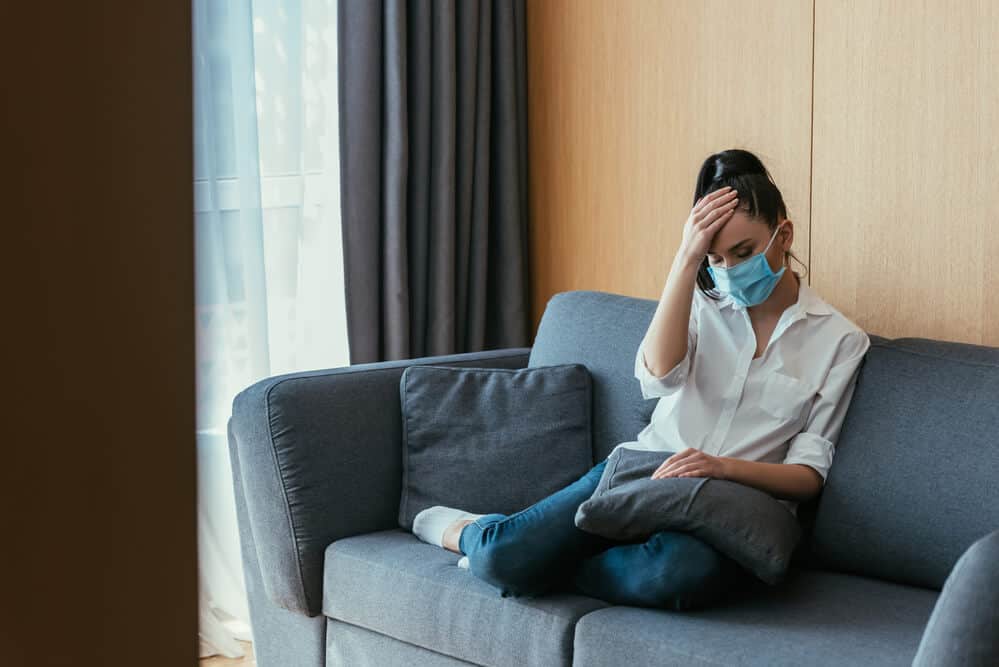
Many people across North Carolina are struggling with depression as the Covid-19 pandemic continues. This unprecedented time in history is particularly difficult for people with persistent depressive disorder (PDD). What is this mental health condition and how do you get help for your coronavirus isolation blues?
Is Depression common during the Covid pandemic?

Everyone struggles with mental health problems at some time in life. This is especially true during the Covid pandemic. You may find yourself feeling less energetic than usual, perhaps even sad and unable to find a light at the end of the proverbial tunnel. While most people come out of bouts of sadness, it is possible to experience lingering feelings like these. Sometimes, these signs point to a type of depression called persistent depressive disorder. PDD is also called dysthymia.
The increased stress of the Covid pandemic is causing many to feel anxious about finances, isolation, and the prospect of getting the coronavirus. As a result, depression can take hold. In fact, according to a September 2020 survey published in the online edition of JAMA Network Open, one in four American adults has suffered depressive symptoms during the Covid pandemic. Mental Health America backs up these results with their own data showing that 406 times more people went through online mental health screenings in May 2020. 457% more than January 2020 performed these screenings in June of the same year.
About PDD, a Different Type of Depression
Depression is clearly more common during the Covid pandemic. But persistent depressive disorder is difficult to recognize. It does not interfere as much with daily living as some types of depression. Many people who suffer PDD actually get used to feeling this way as the depressive symptoms come and go.
Symptoms of PDD vary from person to person. Generally, these include feeling depressed more often than not. For example, someone with persistent depressive disorder may experience a low mood for two years with only about two months of symptom relief.
To receive a diagnosis of PDD, you must exhibit a variety of symptoms. At least two of these effects must exist:
- Weight changes
- Sleep problems
- Low self-esteem
- Lost energy or fatigue
- Lost enjoyment of favorite activities
- Problems concentrating or decision-making
- Hopeless feelings
Besides the above signs of PDD, you can also experience other signs. Common to people with persistent depressive disorder are stomach or gastrointestinal upset and headaches. You may also feel irritable, often disagreeing with friends, family, or coworkers.
If left untreated, your health can suffer. In fact, PDD increases your risk of multiple serious health problems. These include heart disease and high blood pressure. You can also experience major depression on top of persistent depressive disorder as part of a condition called double depression.
Preventing Depression during the Covid Pandemic
It is important to keep your spirits up during the coming months of the Covid pandemic. This is true whether you have PDD or not. Anyone can suffer a bout of depression and if that is going to occur in your lifetime, these circumstances are right for mental health problems.
To prevent depression during the Covid pandemic, take small steps each day to maintain a positive mood. Stay engaged in your favorite activities, as much as possible. Take daily walks and pursue new indoor hobbies that challenge your brain. Read, cook, pursue a daily physical challenge or find other ways to inspire yourself in new ways.
Having Support Is Key
To feel better, you first need to recognize when you are experiencing symptoms of depression. This is often harder than it sounds. Some people are not as aware of changing moods when compared to others. Always ask for help when you need it such as from a friend, partner, or another family member. Talk to them about your feelings and ask that they help you recognize when your behavior changes.
If you suspect you or someone else you love has a persistent depressive disorder or other depression, it is important to seek help. A professional evaluation by a licensed therapist is key. They have the experience and qualifications to make an accurate diagnosis. They can also provide the right treatment.
PDD and other types of depression respond well to talk therapy, medication, or both. Online therapy is an easy and convenient means of starting therapy. Your teletherapy professional can treat you just as they would in their office. But it is easier for you to keep your appointments and stay on track with treatment, thanks to the Internet and a WiFi connection.
CDC Recommendations to Prevent Depression
The Centers for Disease Control and Prevention recently published some recommendations for coping with the pandemic. These tips can also help you prevent and heal from your Covid isolation-related depression.
Tips include:
- Spend less time reading about the pandemic
- Practice deep breathing on a daily basis
- Eat well-balanced meals
- Get plenty of sleep
- Exercise daily
- Spend time outside
- Pursue favorite activities
- Stay connected with others
- Seek therapy when needed
North Carolina Teletherapy for Depression
If you live in North Carolina and struggle with symptoms of depression, teletherapy can help you start feeling better. Greene Psychology Group of Raleigh now provides all treatment through telehealth appointments. Teletherapy is a great way to conveniently access the therapy you need from the convenience of your own home or office. Schedule your first appointment today by calling 919-205-5339.
